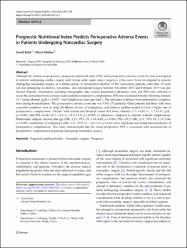Prognostic Nutritional Index Predicts Perioperative Adverse Events in Patients Undergoing Noncardiac Surgery
Özet
Although the relation of preoperative prognostic nutritional index (PNI) with perioperative adverse events has been investigated in patients undergoing cardiac surgery and various solid organ cancer surgeries, it has never been investigated in patients undergoing noncardiac surgery as a distinct group. A retrospective analysis of 811 consecutive patients, older than 18 years old and undergoing an elective, noncardiac, and nonvascular surgery between November 2015 and February 2019 was performed. Patients' information, including demographic data, routine preoperative laboratory tests, and PNI were collected to assess the association between these factors and the perioperative complications. PNI was calculated from the following formula: 10 x serum albumin (g/dL) + 0.005 x total lymphocyte count (per mm(3)). The outcomes of interest were perioperative complications during hospitalization. The perioperative adverse event rate was 9.0% (73 patients). Older patients and those with more comorbid conditions such as atrial fibrillation, history of malignancy, and diabetes mellitus tended to have a higher rate of perioperative complications. Patients with complicated hospital course had lower albumin (3.1 +/- 0.41 vs. 3.7 +/- 0.62 g/dL; p < 0.001) and PNI levels (45.1 +/- 4.4 vs. 51.8 +/- 5.8; p < 0.001) at admission compared to patients without complications. Multivariate analysis showed that age (OR, 2.13; 95% CI, 1.14-4.45; p < 0.01), PNI < 47.5 (OR, 2.51; 95% CI, 1.19-5.46; p = 0.005), and history of malignancy (OR, 3.11; 95% CI, 1.14-5.33; p < 0.01) were significant and independent predictors of perioperative complications. This study demonstrated that the lower preoperative PNI is associated with increased rate of perioperative complications in patients undergoing noncardiac surgery.


















